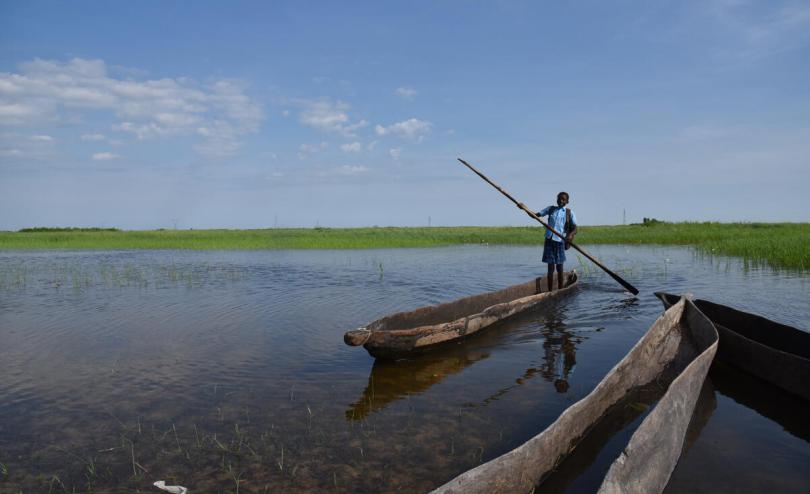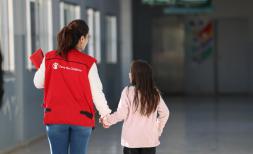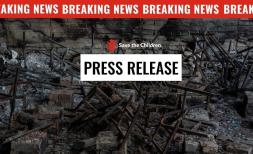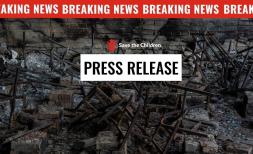Zambia: Island school keeps children learning against backdrop of climate crisis

LUSAKA, 20 April 2022 – A school built on a raised island on the Zambezi floodplains is helping children from remote farming communities access education all year round as climate change takes an ever greater toll on their daily lives.
The floodplains are underwater for six months of the year during which time the school can only be reached by canoe. Every day children paddle from their homes on a nearby island to the school, sometimes several at a time, like floating narrow school buses.
The school was the brainchild of Muimui, 87, the headman of the village, who was worried that local children were missing the opportunity to learn skills outside of farming. He saw this as particularly important in recent decades, as climate change made it ever more difficult for families to farm the floodplains effectively.
Farming families are being particularly affected by the changes in weather patterns, as they depend on rain to support the production of maize, the country’s principal food crop. The rainy season is coming later each year, with the share of time spent in the dry season or drought becoming progressively longer.
In 2015, Muimui and his fellow villagers decided to build the school on a piece of raised land.
In 2016, Save the Children started supporting the school, providing learning materials like books, desks and cupboards. Save the Children has also provided training to community teachers who volunteer at the school and recently built a solar-powered water pump for the school, so the children could wash their hands and drink clean water.
Sitali, 12, is Muimui’s granddaughter and attends school every day. She said:
“When I am at school, I study. My favourite subjects are science and English. I like it when the teacher shows us how to protect ourselves against illness.
“I feel good paddling the boat, I like doing it because I know how to do it and I can do it well.”
Muimui, 87, said:
“Since I have been in this village, I have seen changes. The rain is not coming as it was. There used to be drought and rain, but now the drought stretches out more. We are troubled on how to water our farms and gardens because there is less rain. This is a big challenge. Our living is not in a good state. And during the longer droughts, we struggle to make a living. This is the challenge we have because there isn’t enough rain to water our crops.
“It is very different now. Normally, during the wet season, the water goes deep deep down. The Zambezi river used to be higher. The water patterns have changed.
“It’s climate change. Because everything has changed.”
Farming families in Zambia are experiencing a slow and silent climate crisis that has driven about 13% of the population into severe food shortages and which is having a knock-on effect across the country, said Save the Children.
The agency is sounding the alarm for around 1.58 million people – including an estimated 821,000 children – who are in the midst of an underreported environmental disaster, including prolonged dry spells, extreme high temperatures, devastating insect swarms, and floods. Zambia topped the list of the world’s underreported crisis in 2021, showing that despite enormous needs, the country’s slow creeping yet catastrophic suffering is being overshadowed by more attention-grabbing emergencies.
Save the Children has been working in Zambia for nearly 40 years, running health, nutrition, education and protection programs across the country. In response to the climate change-induced hunger crisis, Save the Children is running school feeding programmes, providing education materials to children, and providing emergency cash and voucher assistance.
The multimedia content is available here: https://www.contenthubsavethechildren.org/Package/2O4C2S81HFOI




